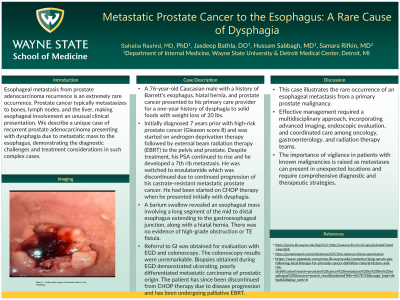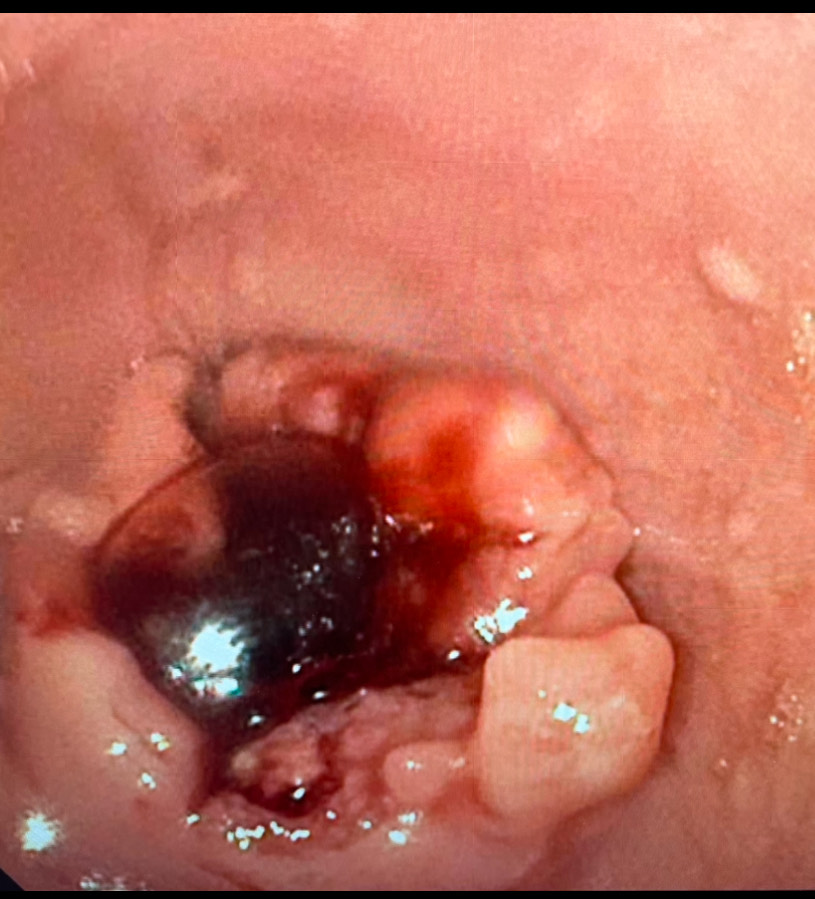Sunday Poster Session
Category: Esophagus
P0611 - Metastatic Prostate Cancer to the Esophagus: A Rare Cause of Dysphagia
Sunday, October 27, 2024
3:30 PM - 7:00 PM ET
Location: Exhibit Hall E

Has Audio
- SR
Sahalia Rashid, MD, PhD
Wayne State University School of Medicine / Detroit Medical Center
Detroit, MI
Presenting Author(s)
Sahalia Rashid, MD, PhD1, Jasdeep Bathla, MD2, Hussam Sabbagh, MD1, Samara Rifkin, MD2
1Wayne State University School of Medicine / Detroit Medical Center, Detroit, MI; 2Detroit Medical Center/Wayne State University, Detroit, MI
Introduction: Esophageal metastasis from prostate adenocarcinoma recurrence is an extremely rare occurrence. Prostate cancer typically metastasizes to bones, lymph nodes, and the liver, making esophageal involvement an unusual clinical presentation. We describe a unique case of recurrent prostate adenocarcinoma presenting with dysphagia due to metastatic mass to the esophagus, demonstrating the diagnostic challenges and treatment considerations in such complex cases.
Case Description/Methods: A 76-year-old Caucasian male with a history of Barrett’s esophagus, hiatal hernia, and prostate cancer presented to his primary care provider for a one-year history of dysphagia to solid foods with weight loss exceeding 20 pounds. He was initially diagnosed about 7 years prior with high-risk prostate cancer (Gleason score 8) and was started on androgen deprivation therapy followed by external beam radiation therapy (EBRT) to the pelvis and prostate. Despite treatment, his prostate-specific antigen continued to rise and he developed a 7th rib metastasis. He was switched to enzulatamide which was discontinued due to continued progression of his castrate-resistant metastatic prostate cancer. He had been started on CHOP therapy when he presented initially with dysphagia. A barium swallow revealed an esophageal mass involving a long segment of the mid to distal esophagus extending to the gastroesophageal junction, along with a hiatal hernia. There was no evidence of high-grade obstruction or TE fistula. The patient was referred to gastroenterology (GI) for further evaluation with EGD and colonoscopy. The colonoscopy results were unremarkable. Biopsies obtained during EGD demonstrated ulcerating, poorly differentiated metastatic carcinoma of prostatic origin. The patient has since been discontinued from CHOP therapy due to disease progression and has been undergoing palliative EBRT.
Discussion: This case illustrates the rare occurrence of an esophageal metastasis from a primary prostate malignancy. Effective management required a multidisciplinary approach, incorporating advanced imaging, endoscopic evaluation, and coordinated care among oncology, gastroenterology, and radiation therapy teams. The importance of vigilance in patients with known malignancies is raised as metastases can present in unexpected locations and require comprehensive diagnostic and therapeutic strategies.

Disclosures:
Sahalia Rashid, MD, PhD1, Jasdeep Bathla, MD2, Hussam Sabbagh, MD1, Samara Rifkin, MD2. P0611 - Metastatic Prostate Cancer to the Esophagus: A Rare Cause of Dysphagia, ACG 2024 Annual Scientific Meeting Abstracts. Philadelphia, PA: American College of Gastroenterology.
1Wayne State University School of Medicine / Detroit Medical Center, Detroit, MI; 2Detroit Medical Center/Wayne State University, Detroit, MI
Introduction: Esophageal metastasis from prostate adenocarcinoma recurrence is an extremely rare occurrence. Prostate cancer typically metastasizes to bones, lymph nodes, and the liver, making esophageal involvement an unusual clinical presentation. We describe a unique case of recurrent prostate adenocarcinoma presenting with dysphagia due to metastatic mass to the esophagus, demonstrating the diagnostic challenges and treatment considerations in such complex cases.
Case Description/Methods: A 76-year-old Caucasian male with a history of Barrett’s esophagus, hiatal hernia, and prostate cancer presented to his primary care provider for a one-year history of dysphagia to solid foods with weight loss exceeding 20 pounds. He was initially diagnosed about 7 years prior with high-risk prostate cancer (Gleason score 8) and was started on androgen deprivation therapy followed by external beam radiation therapy (EBRT) to the pelvis and prostate. Despite treatment, his prostate-specific antigen continued to rise and he developed a 7th rib metastasis. He was switched to enzulatamide which was discontinued due to continued progression of his castrate-resistant metastatic prostate cancer. He had been started on CHOP therapy when he presented initially with dysphagia. A barium swallow revealed an esophageal mass involving a long segment of the mid to distal esophagus extending to the gastroesophageal junction, along with a hiatal hernia. There was no evidence of high-grade obstruction or TE fistula. The patient was referred to gastroenterology (GI) for further evaluation with EGD and colonoscopy. The colonoscopy results were unremarkable. Biopsies obtained during EGD demonstrated ulcerating, poorly differentiated metastatic carcinoma of prostatic origin. The patient has since been discontinued from CHOP therapy due to disease progression and has been undergoing palliative EBRT.
Discussion: This case illustrates the rare occurrence of an esophageal metastasis from a primary prostate malignancy. Effective management required a multidisciplinary approach, incorporating advanced imaging, endoscopic evaluation, and coordinated care among oncology, gastroenterology, and radiation therapy teams. The importance of vigilance in patients with known malignancies is raised as metastases can present in unexpected locations and require comprehensive diagnostic and therapeutic strategies.

Figure: Ulcerating esophageal mass on EGD
Disclosures:
Sahalia Rashid indicated no relevant financial relationships.
Jasdeep Bathla indicated no relevant financial relationships.
Hussam Sabbagh indicated no relevant financial relationships.
Samara Rifkin indicated no relevant financial relationships.
Sahalia Rashid, MD, PhD1, Jasdeep Bathla, MD2, Hussam Sabbagh, MD1, Samara Rifkin, MD2. P0611 - Metastatic Prostate Cancer to the Esophagus: A Rare Cause of Dysphagia, ACG 2024 Annual Scientific Meeting Abstracts. Philadelphia, PA: American College of Gastroenterology.
